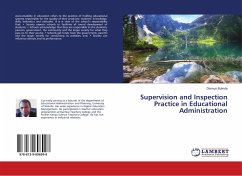
The Challenge of Educational Administration Today
Versandkostenfrei!
Versandfertig in 6-10 Tagen
36,99 €
inkl. MwSt.

PAYBACK Punkte
18 °P sammeln!
A school that is set up on democratic principles may be explained as exhibiting the characteristics of numerous and more varied points of shared common interest to the principal, teachers, students and the school community. The school will have greater reliance upon the recognition of mutual interest as a factor of social control. The school will, therefore, have freer interaction between the principal, the teachers, the students, the parents and the Board of Management. The relationship between these school community members will show a continuous re-adjustment through meeting new situations ...
A school that is set up on democratic principles may be explained as exhibiting the characteristics of numerous and more varied points of shared common interest to the principal, teachers, students and the school community. The school will have greater reliance upon the recognition of mutual interest as a factor of social control. The school will, therefore, have freer interaction between the principal, the teachers, the students, the parents and the Board of Management. The relationship between these school community members will show a continuous re-adjustment through meeting new situations produced by varied interaction as occasions will demand. The environment which can encourage this relationship can be developed by the continuous application of participatory leadership styles by the principal. The use of participatory leadership styles in schools extends the power sources available and has the benefit of making the principals, the teachers and the students to identify with the aims and objectives of the school.












